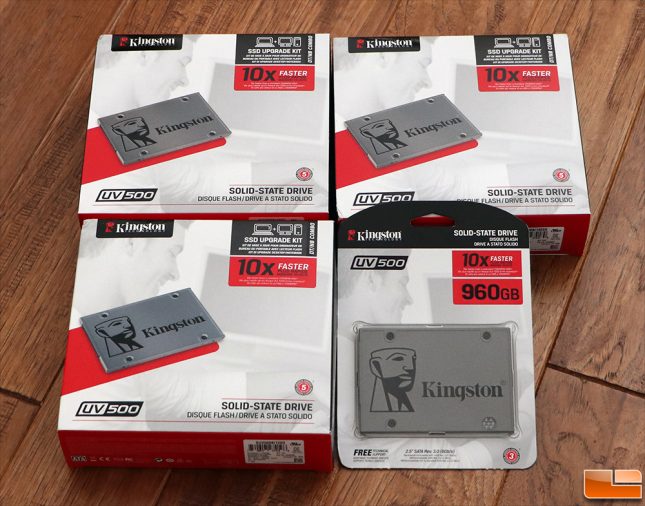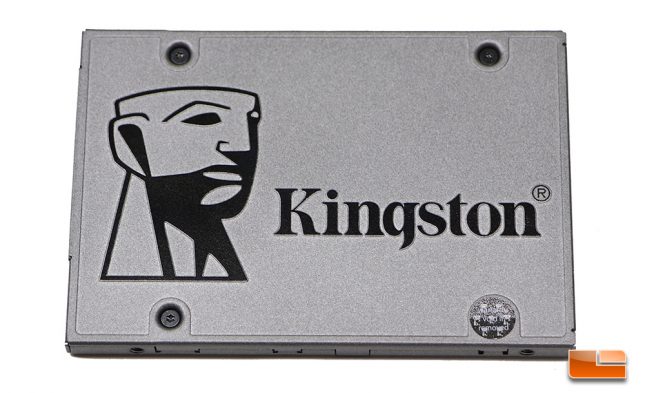Kingston UV500 SATA SSD Review – Self-Encrypting Drive
Final Thoughts and Conclusions
The Kingston UV500 SSD series of selfencrypting drives is listed as both a consumer and business SSD by Kingston. The UV500 SATA SSD family is available in a wide variety of form factors (2.5, M.2 and mSATA) and features the latest 3D TLC NAND. This series offers respectable performance for SATA III SSDs with sequential read/write speeds topping out at 540 MB/s read and 530 MB/s write in our testing on the Intel Z370 desktop platform. That is about as good as it gets for the SATA III platform as we’ve been performance bottlenecked here for a number of years now.
The key selling point for the UV500 series is that it is a low cost selfencrypting drive and that is also why Kingston lists it as a business SSD. We love the fact that this drive has end-to-end data protection using 256-bit AES Hardware-based encryption and support for TCG Opal 2.0 security management, but that is something very few home users will ever use. We just don’t see too many individuals buying endpoint offerings from McAfee, Wave and WinMagic to properly lock down one of these drives. One good thing that we’d like to point out is that Kingston has been working on BitLocker support for several months and expects to roll out a firmware update for the UV500 series in in the next 60 days. Once the new firmware update is applied the UV500 drive series should meet the IEEE-1667 specification required for BitLocker to use hardware encryption. Hopefully this goes smoothly as it would make this drive even more appealing. Device encryption is something we like as it helps protect your data by encrypting it. Only someone with the right encryption key (such as a password) can decrypt it. The bad news is that Windows 10 Home does not include BitLocker support as that feature reserved for Windows 10 Pro or Windows 10 Enterprise. Of course, it should also be noted that your PC needs to be equipped with a Trusted Platform Module (TPM) chip. Your computer must have a TPM chip version 1.2 or later to support BitLocker. You can check your PC manufacturer’s support website to find out if your device includes the security chip, and for instructions to enable the chip in the BIOS (if it is an option that is not enabled by default). If your computer doesn’t include a TPM, you can still use encryption, but you’ll need to use the Local Group Policy Editor to enable additional authentication at startup. Who said securing and protecting your data was easy? It’s certainly going to cause you to jump through some extra hoops to get it enabled, but it is worth it if you want to secure your data.
Who knows, maybe when Kingston rolls out the new firmware for this drive we’ll do a quick write-up on how to use BitLocker on Windows 10 Pro as a follow-up to this review. If that is something you’d like to see be sure to leave a comment below.
The Kingston UV500 series is available capacities of 120GB, 480GB, 960GB and 1.92TB when talking about the 2.5-inch form factor. Our testing showed the UV500 480GB drive having solid performance and it happens to have the lowest price per GB of storage space. Not bad for an SED SSD that is backed by a 5-year warranty and respectable endurance ratings. The UV500 480GB is rated at 200 TBW, so that works out to being around 109.6 GB of drive writes per day. If you write more data than that per day you can easily move up to the UV500 960GB drive with its 480 TBW rating that works out to be nearly 263 GB/day of drive writes.
- UV500 120GB: $43.03 shipped ($0.36 per GB)
- UV500 240GB: $73.46 shipped ($0.31 per GB)
- UV500 480GB: $112.13 shipped ($0.23 per GB)
- UV500 960GB: $261.59 shipped ($0.27 per GB)
- UV500 1.92TB: $560.51 shipped ($0.29 per GB)
At the end of the day, the UV500 series is something we’d recommend to consumers looking to be security conscious or for really any business user. Many businesses are looking to meet EU General Data Protection Regulation (GDPR) compliance to safeguard clients data and this drive will do the trick when properly secured. It should also be noted that enabling encryption on this drive is fast. The Kingston UV500 480GB drive for example can be locked down by WinMagic in just 15 seconds. It’s that quick since WinMagic recognizes the UV500 as a TCG Opal enabled SSD with built in Hardware encryption, so there is no need to enable its own software encryption to protect data. If you installed WinMagic and enabled software encryption on the Kingston UV400 480GB it would take about 2.5 hours to encrypt the drive with your PC with the CPU of the system doing the work. Doing the same to a 500GB 7200 RPM would take roughly 14 hours! Imagine a business that has dozens, hundreds or even thousands of systems to encrypt and the time savings here could be huge.
Legit Bottom Line: The Kingston UV500 might look like another low-cost SATA III drive, but this drive is selfencrypting on the fly and just needs to have a lock enabled to protect your data!



